...did I seriously just spend an entire evening doing this. Um.
Okay, maybe this was inevitable, maybe it was not, but I'm riding this high all the way to the finish and for that reason I present--
Girl Genius is a webcomic by Phil and Kaja Foglio, a cartoonist couple whose previous works included the D&D supplement on sex. Yes. That--that kind of says a lot about them. They've also done gaming humor, some of the best Magic: The Gathering illustrations out there, and, um, more porn. Really happy, enthusiastic porn, though! I may be getting off-subject now. My point is, they are pretty awesome people with a pretty awesome track record, and then one day they decided to do a longform comic about mad scientists, because why not. It started in print, but eventually, they moved it to the web, because they actually made more money that way, go figure.
"A longform comic about mad scientists" is, while an accurate description, something of a surface one. The description used on the cover of every volume is "A Gaslamp Fantasy with Adventure, Romance, & Mad Science", which is a bit better. What it actually is, however, is simply Very Good. It is a genuinely well-written comic about mad scientists. The mad scientists have surprising levels of character depth. The world and events occurring around the mad scientists are remarkably complex and interesting. It even manages to be funny and endearing while it forces you to the edge of your seat. And there's a bit that makes me bawl like a baby every damn time--but I'm getting ahead of myself.
The main character of Girl Genius is one Agatha Clay, an unlucky student at Transylvania Polygnostic University plagued by headaches and the fact that everything she creates malfunctions--
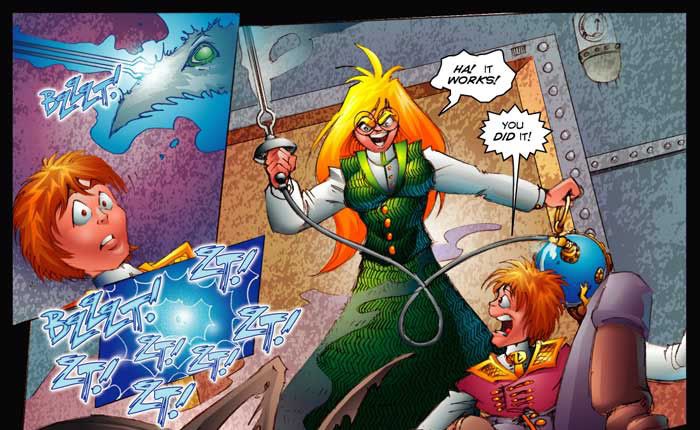
--until she discovers that she is in fact Agatha Heterodyne, last surviving member of a mad scientist family who historically produced insanely-powerful continent-conquering madmen but in the previous generation somehow came up with a couple genuine heroes. Who disappeared, leaving the continent in turmoil. This discovery makes her life much more interesting and her creations much more successful, but also throws her into constant danger, as a surviving Heterodyne is not exactly something that the various political factions on the continent want to exist without being under their control. The largest political faction, and by "faction" I mean "empire controlling all of Europa with an iron fist" is Baron Wulfenbach, a man who traveled with Agatha's parents back in the good old days of heroism. He has a son.
This is Gilgamesh Wulfenbach.
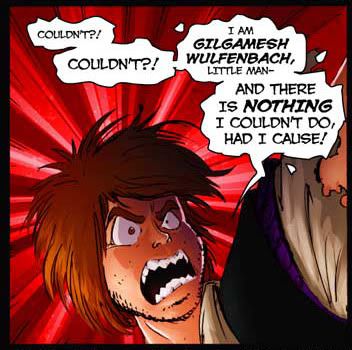
...he has his off days.
For the most part, though, Gil is an extremely talented mad scientist--the term 'Spark' is used for those who have an almost inhuman gift for it, very much including Agatha and Gil--who actually is not a bad guy, he's just under a lot of pressure. He falls head-over-heels in love with Agatha, which only makes things worse, since his dad wants to control her and she may or may not be evil (it's complicated). Genre-savvy readers may recall the trope of The Mad Scientist's Beautiful Daughter; well, Gil is The Mad Scientist's Handsome Son. He's very good at what he does, but recently in the comic he's become something of a damsel in distress. He starts out as kind of a jackass--I don't care how good a match you think you'd be, it's just a bad idea to propose to a girl two days after you meet her--but eventually his relationship with Agatha becomes more like this:
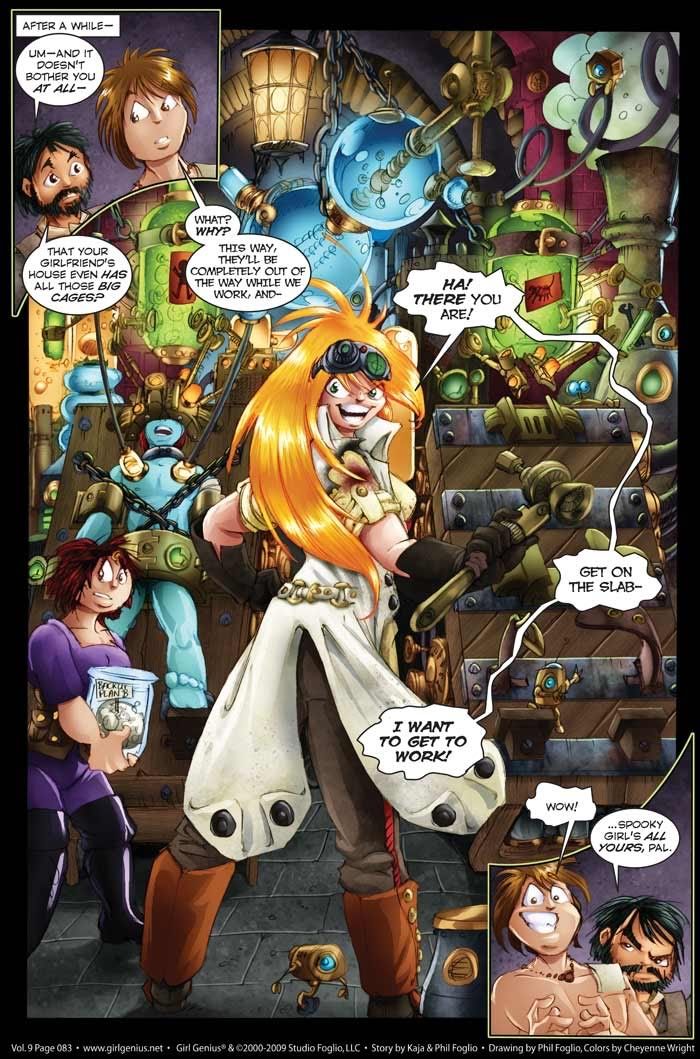
You may at this point have realized another reason why I like this comic so much.
Anyway, Agatha and Gil may be the main-main characters, but there are a whole host of others! Seriously, a whole host. It would be a long and difficult endeavor to name all the significant people, so here's a breakdown of the most important ones:
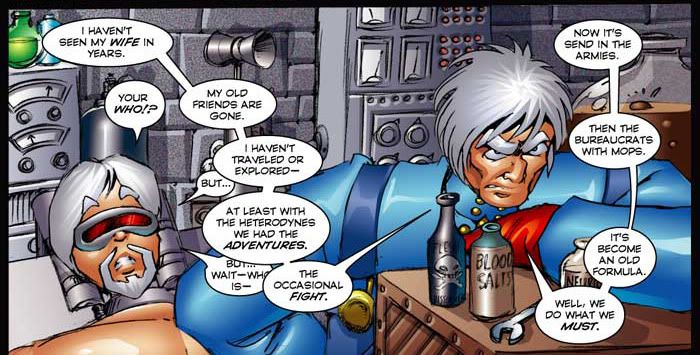
Baron Klaus Wulfenbach, father of Gil, sort-of-friend to Agatha's missing parents, and tyrannical ruler of Europa. Well, kind of. He may be a tyrant, but he's actually a very good tyrant--in a world full of people who can build armies of monsters and robots, you need a fair bit of force to keep everything stable. Mostly he lets regions run themselves with the stipulation that he can and will destroy them if they do something wrong. As the image suggests, he does not like his job. He does legitimately care about his son, but as he shows this by constantly testing Gil and forcing him to prove himself worthy of being the next ruler, it is sometimes difficult to tell. Is he evil? Well, he's an antagonist. The rest is debatable.
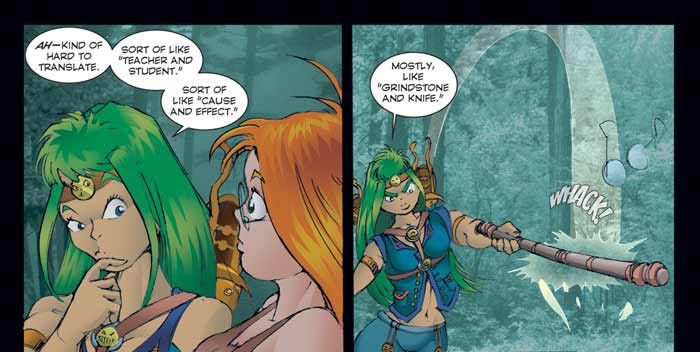
Zeetha is a warrior from a lost civilization. I mean 'lost' in a somewhat literal sense--she was sent as a diplomat with the people who 'discovered' it, but all the other people died on the return journey and she doesn't remember the way back. She has some anger issues about this. When we first meet Zeetha, she's with a traveling circus; plot stuff happens and she becomes Agatha's personal trainer/BFF. This is where the Bechdel Test kicks in hard, folks. Zeetha is the sanest of Agatha's allies, although that really, really, isn't saying much. She also acts as a big sister of sorts, particularly when Agatha's romantic travails are involved:
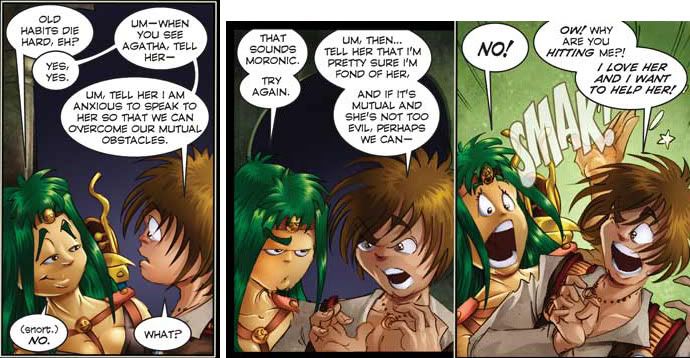
Unfortunately, she doesn't show up until volume 4, but once she does, she sticks around. A fellow who does not show up until volume 5 but somehow becomes a main character once he does is:

Tarvek Sturmvoraus, son of the ruling family of Sturmhalten. He's a very nice boy! Erm. When he's not being part of a group that secretly wants to overthrow Baron Wulfenbach and establish their own control over Europa. Tarvek's position on the Protagonist vs. Antagonist scale is...flexible. In a recent strip he actually admitted to being one of the bad guys. But he's a bad guy who doesn't approve of the way the rest of the group is handling things and who decides to help Agatha, so he can't be that bad, right?
Unless you're Gil, in which case he's the most despicable person on the planet.
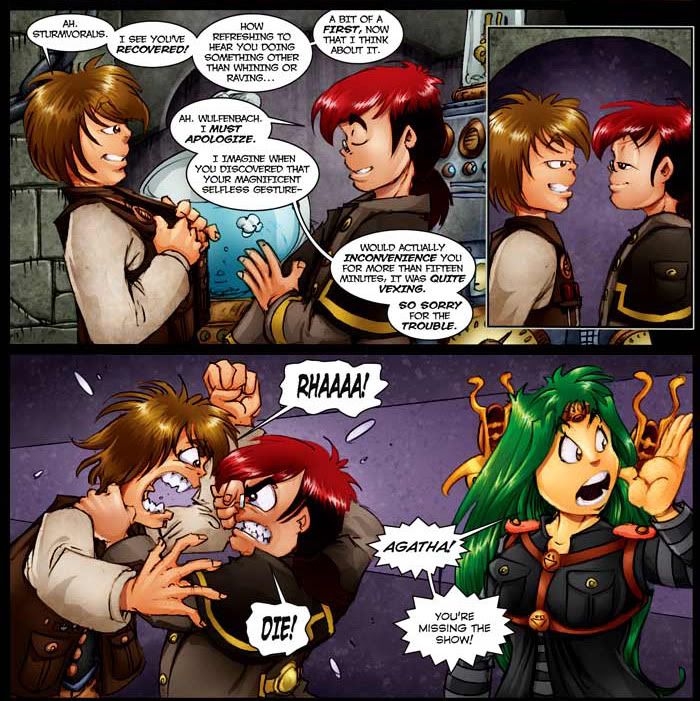
In fairness, though, Tarvek despises Gil right back.
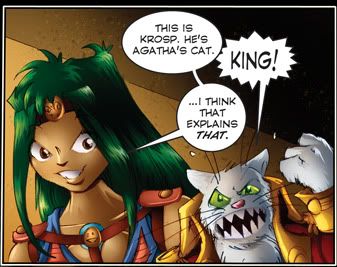
Krosp is a talking cat who hangs around Agatha and may or may not be planning to take over the world.
That's pretty much all I can say about that.
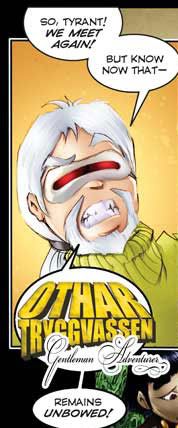
...is self-introducing. His position on the Protagonist vs. Antagonist scale is also uncertain, but unlike Tarvek, this is because he is unambiguously one of the good guys--it's just that, um, Agatha and her friends do not always fall under the banner of what he considers to be good. He seems to be the under the impression that he is the hero of an old-fashioned pulp serial. Klaus and Gil really do not like him at all.

The Jagermonsters are a species of evil monsters, hell-bent on causing as much destruction and mayhem as possible. They are also 1) Klaus' best shock troops, 2) completely and totally loyal to Agatha, since the Heterodynes were the ones who made them in the first place, and 3) um, kind of awesome. They show up as minor characters or extras for the most part, but there are three in particular who band up with Agatha starting in volume 5, and those are the ones in the picture. Jagers are virtually unkillable. Jagers enjoy nothing more than a good war. Jagers are really, really fond of their hats.
As I said, there are many many more characters, but these are the most significant non-incredibly-spoilery ones.
I did mention that the Foglios have done a not inconsiderable amount of pure smut, yes? Well, Girl Genius...kind of shows echoes of that, without any actual naughty bits or goings-on onscreen. The ladies tend toward the buxom-and-curvy side, there's quite a lot of Victorian underwear, and anyone who is looking for cheesecake will be perfectly happy--and yet it's all remarkably classy. Perhaps it helps that it's not actually that gratuitous? Or that the ladies are still strong characters? Or that Tarvek spends the entirety of volume nine shirtless and Gil is on more than one occasion completely naked?
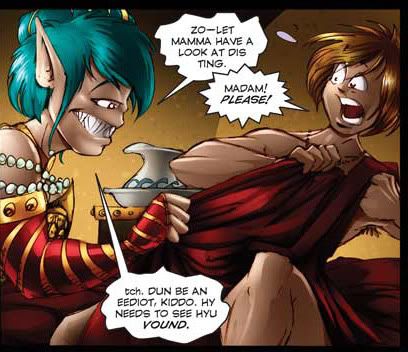
Whatever it is, I find it more an endearing quality rather than a negative one.
In any case, Girl Genius is an excellent webcomic with excellent ladies and excellent plot and excellent humor and recently a lot of jokes about threesomes, and how can you go wrong with any of that? Check it out! You may lose a few days of your life by devouring seven years of archives in one sitting, but there are worse ways to go.
In conclusion:
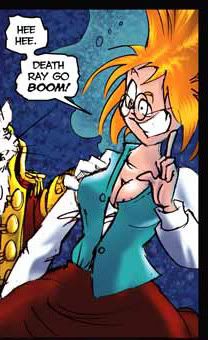
Girl Genius is a webcomic by Phil and Kaja Foglio, a cartoonist couple whose previous works included the D&D supplement on sex. Yes. That--that kind of says a lot about them. They've also done gaming humor, some of the best Magic: The Gathering illustrations out there, and, um, more porn. Really happy, enthusiastic porn, though! I may be getting off-subject now. My point is, they are pretty awesome people with a pretty awesome track record, and then one day they decided to do a longform comic about mad scientists, because why not. It started in print, but eventually, they moved it to the web, because they actually made more money that way, go figure.
"A longform comic about mad scientists" is, while an accurate description, something of a surface one. The description used on the cover of every volume is "A Gaslamp Fantasy with Adventure, Romance, & Mad Science", which is a bit better. What it actually is, however, is simply Very Good. It is a genuinely well-written comic about mad scientists. The mad scientists have surprising levels of character depth. The world and events occurring around the mad scientists are remarkably complex and interesting. It even manages to be funny and endearing while it forces you to the edge of your seat. And there's a bit that makes me bawl like a baby every damn time--but I'm getting ahead of myself.
The main character of Girl Genius is one Agatha Clay, an unlucky student at Transylvania Polygnostic University plagued by headaches and the fact that everything she creates malfunctions--

--until she discovers that she is in fact Agatha Heterodyne, last surviving member of a mad scientist family who historically produced insanely-powerful continent-conquering madmen but in the previous generation somehow came up with a couple genuine heroes. Who disappeared, leaving the continent in turmoil. This discovery makes her life much more interesting and her creations much more successful, but also throws her into constant danger, as a surviving Heterodyne is not exactly something that the various political factions on the continent want to exist without being under their control. The largest political faction, and by "faction" I mean "empire controlling all of Europa with an iron fist" is Baron Wulfenbach, a man who traveled with Agatha's parents back in the good old days of heroism. He has a son.
This is Gilgamesh Wulfenbach.

...he has his off days.
For the most part, though, Gil is an extremely talented mad scientist--the term 'Spark' is used for those who have an almost inhuman gift for it, very much including Agatha and Gil--who actually is not a bad guy, he's just under a lot of pressure. He falls head-over-heels in love with Agatha, which only makes things worse, since his dad wants to control her and she may or may not be evil (it's complicated). Genre-savvy readers may recall the trope of The Mad Scientist's Beautiful Daughter; well, Gil is The Mad Scientist's Handsome Son. He's very good at what he does, but recently in the comic he's become something of a damsel in distress. He starts out as kind of a jackass--I don't care how good a match you think you'd be, it's just a bad idea to propose to a girl two days after you meet her--but eventually his relationship with Agatha becomes more like this:

You may at this point have realized another reason why I like this comic so much.
Anyway, Agatha and Gil may be the main-main characters, but there are a whole host of others! Seriously, a whole host. It would be a long and difficult endeavor to name all the significant people, so here's a breakdown of the most important ones:

Baron Klaus Wulfenbach, father of Gil, sort-of-friend to Agatha's missing parents, and tyrannical ruler of Europa. Well, kind of. He may be a tyrant, but he's actually a very good tyrant--in a world full of people who can build armies of monsters and robots, you need a fair bit of force to keep everything stable. Mostly he lets regions run themselves with the stipulation that he can and will destroy them if they do something wrong. As the image suggests, he does not like his job. He does legitimately care about his son, but as he shows this by constantly testing Gil and forcing him to prove himself worthy of being the next ruler, it is sometimes difficult to tell. Is he evil? Well, he's an antagonist. The rest is debatable.

Zeetha is a warrior from a lost civilization. I mean 'lost' in a somewhat literal sense--she was sent as a diplomat with the people who 'discovered' it, but all the other people died on the return journey and she doesn't remember the way back. She has some anger issues about this. When we first meet Zeetha, she's with a traveling circus; plot stuff happens and she becomes Agatha's personal trainer/BFF. This is where the Bechdel Test kicks in hard, folks. Zeetha is the sanest of Agatha's allies, although that really, really, isn't saying much. She also acts as a big sister of sorts, particularly when Agatha's romantic travails are involved:

Unfortunately, she doesn't show up until volume 4, but once she does, she sticks around. A fellow who does not show up until volume 5 but somehow becomes a main character once he does is:

Tarvek Sturmvoraus, son of the ruling family of Sturmhalten. He's a very nice boy! Erm. When he's not being part of a group that secretly wants to overthrow Baron Wulfenbach and establish their own control over Europa. Tarvek's position on the Protagonist vs. Antagonist scale is...flexible. In a recent strip he actually admitted to being one of the bad guys. But he's a bad guy who doesn't approve of the way the rest of the group is handling things and who decides to help Agatha, so he can't be that bad, right?
Unless you're Gil, in which case he's the most despicable person on the planet.

In fairness, though, Tarvek despises Gil right back.

Krosp is a talking cat who hangs around Agatha and may or may not be planning to take over the world.
That's pretty much all I can say about that.

...is self-introducing. His position on the Protagonist vs. Antagonist scale is also uncertain, but unlike Tarvek, this is because he is unambiguously one of the good guys--it's just that, um, Agatha and her friends do not always fall under the banner of what he considers to be good. He seems to be the under the impression that he is the hero of an old-fashioned pulp serial. Klaus and Gil really do not like him at all.

The Jagermonsters are a species of evil monsters, hell-bent on causing as much destruction and mayhem as possible. They are also 1) Klaus' best shock troops, 2) completely and totally loyal to Agatha, since the Heterodynes were the ones who made them in the first place, and 3) um, kind of awesome. They show up as minor characters or extras for the most part, but there are three in particular who band up with Agatha starting in volume 5, and those are the ones in the picture. Jagers are virtually unkillable. Jagers enjoy nothing more than a good war. Jagers are really, really fond of their hats.
As I said, there are many many more characters, but these are the most significant non-incredibly-spoilery ones.
I did mention that the Foglios have done a not inconsiderable amount of pure smut, yes? Well, Girl Genius...kind of shows echoes of that, without any actual naughty bits or goings-on onscreen. The ladies tend toward the buxom-and-curvy side, there's quite a lot of Victorian underwear, and anyone who is looking for cheesecake will be perfectly happy--and yet it's all remarkably classy. Perhaps it helps that it's not actually that gratuitous? Or that the ladies are still strong characters? Or that Tarvek spends the entirety of volume nine shirtless and Gil is on more than one occasion completely naked?

Whatever it is, I find it more an endearing quality rather than a negative one.
In any case, Girl Genius is an excellent webcomic with excellent ladies and excellent plot and excellent humor and recently a lot of jokes about threesomes, and how can you go wrong with any of that? Check it out! You may lose a few days of your life by devouring seven years of archives in one sitting, but there are worse ways to go.
In conclusion:
